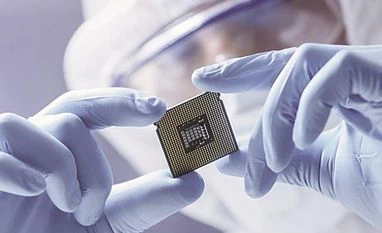India’s ambition to set up a semiconductor plant in the country is slowly coming to fruition. The government has signed an agreement with Belgium-based research and innovation hub, Interuniversity Microelectronics Centre (IMEC), which will provide the technology to manufacture chips of 28 nanometres and above, for which the user has to pay a royalty.
A top government official in the ministry of IT and communications told Business Standard: “We have signed an agreement with IMEC to provide us the technology for chips of 28 nanometers and above. It is the best way to begin, as there is a large demand for chips above 28 nanometres in the country in automotive, consumer electronics and power electronics sectors.”
According to the official, one company out of the three that have applied to set up a chip plant in India will be selected. It will be given the technology and will have to pay the royalty to IMEC.
With most big chip companies like TSMC, Samsung, and Intel concentrating on markets in the US and Europe, where they are setting up foundry plants or expanding their capacity in their own countries, the government has proactively scouted for the technology as that was a key requirement for setting up a chip plant. In fact, IT minister Ashwini Vaishnaw visited IMEC’s Belgium headquarters and played an important role in inking the deal.
The official added: “We do not see any of the big global chip makers coming to India in the initial stages. They will come once an ecosystem is established. We needed to be cautious as we have had two failures earlier in trying to build a chip plant,” said the official.
He also pointed out that the incentives were also tweaked so that chips, irrespective of their nanometre size, would disburse 50 per cent of the investment cost of the plant. Earlier, the disbursal was graded between 35- 50 per cent, based on more incentives for lower nodes.
IMEC, set up in 1984 with the support of the Flemish government to focus on semiconductor research and their applications, has collaborated with the world’s top names in semiconductors, including Intel, TSMC, Samsung, Texas Instruments, and so on. Currently, 75 per cent of the organisation’s budget is funded by industry and the rest from the European Commission and the Flemish government.
The company does not design chips or manufacture wafers for commercial production, but it is the neutral ground for companies working in the hyper-competitive semiconductor industry to get the latest cutting-edge technology in chip-making.
The government is also closely looking at the ability of the applicants to find buyers for their chips. Says the official mentioned above: “In the Vedanta-Foxconn application, the Taiwanese EMS player told us that they would require about $30 billion worth of chips annually for their own electric vehicles and consumer electronics manufacturing globally. They have committed to buy from the Indian plant.”
The official added that the government is aware of the fact that it will take the new fab players some time to woo global chip design makers like Qualcomm and Mediatek to shift some part of their outsourcing to Indian fab plants.
The IMEC deal suits Vedanta-Foxconn, which has announced that it will make chips of 28 nanometres and above. The company has also signed up with the Gujarat government to set up the plant there. It has also committed to investing $7.5 billion to set up the chip plant.
The buyback clause is essential because, while the total market for chips in the country is expected to hit $64 billion by 2026, the challenge is that foundries make chips for intermediaries like chip design companies (such as Qualcomm and Mediatek), which in turn sell them to end users like mobile device players or auto companies.
Most chip design companies have already signed up long-term deals with foundries in Taiwan and other countries, aggregating global demand and hence getting a better price. So Indian chip makers need a substantial initial buyback agreement to sell their wafers.
India’s second applicant, Singapore-based IGSS, has also said it has tied up with IMEC non-exclusively for certain areas of chip technology. However, it has roped in a medium-sized integrated device manufacturer in the US, which will provide them with chip technology and also buy back 20 per cent of the production.
The third applicant, ISMC, also a consortium, has signed up with Tower Corporation of Israel for the technology, in return for which they will take a minority stake. However, Tower has been acquired by Intel. ISMC wants to manufacture analog chips from 65nm, going down to 45nm, to begin with.
Chipping in
The company that has applied to set up a chip plant will be given the technology and will have to pay the royalty to IMEC
An official pointed out that the incentives were also tweaked so that chips, irrespective of their nanometre size, would disburse 50 per cent of the investment cost of the plant
The government is also closely looking at the ability of the applicants to find buyers for their chips
An official added that the government is aware of the fact that it will take the new fab players some time to woo global chip design makers
Unlock 30+ premium stories daily hand-picked by our editors, across devices on browser and app.
Pick your 5 favourite companies, get a daily email with all news updates on them.
Full access to our intuitive epaper - clip, save, share articles from any device; newspaper archives from 2006.
Preferential invites to Business Standard events.
Curated newsletters on markets, personal finance, policy & politics, start-ups, technology, and more.
)